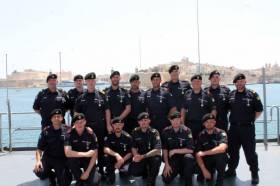Displaying items by tag: Crew Medals
#Navy - Crew members of L.É. Samuel Beckett in Malta last weekend were presented with their Operation Sophia medals from the Irish Naval Service, writes Jehan Ashmore.
Flag Officer Commanding Naval Service (FOCNS) Commodore Michael Malone visited Valletta Harbour last weekend to present the medals to the crew who since April have been deployed in the Mediterranean.
Since the fallout from Libya's boat people trafficking in 2015, the EU launched as a military operation the European Union Naval Force Mediterranean (EUNAVFOR Med) also known as Operation Sophia. The name of the operation was inspired from Sophia, a baby born on board a German Navy frigate whose mother, a Somali refugee was rescued initially by the UK'S Royal Navy.
The 2014 commissioned OPV90 leadship L.É. Samuel Beckett is the second Irish Naval Service patrol ship to take part in Operation Sophia which began last October. On that occasion, OPV80 'Roisin' class LÉ Niamh made history as this was the first time that Ireland joined the EU naval operation tasked against smugglers and traffickers.
Unlike previous other humanitarian missions focusing on Search And Rescue (SAR) of refugees, Operation Sophia among its remit addresses some of the root causes of human-trafficking and migration crisis.
The deployment of LÉ Niamh for Operation Sophia ended late last year. Taking over duties in April this year saw L.É. Samuel Beckett join the EU naval fleet task force comprising of 10 participating member-states.
Following the FOCNS overseas visit to Malta, Commodore Michael Malone conducted another ceremony held in the Naval Base on Haulbowline Island, lower Cork Harbour. This involved an annual inspection of L.É. James Joyce. The second OPV90 class commissioned into service in September 2015 was followed by L.É. William Butler Yeats in October 2016.





























































